Honors and Awards for 2019
GSA Fellowship: Jeffrey Paine
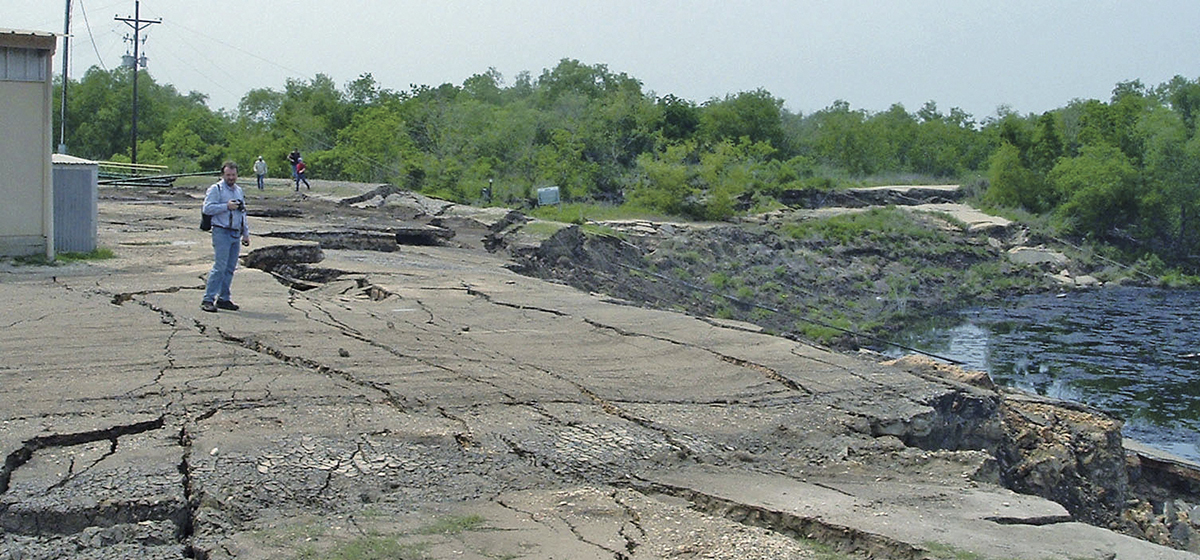
Jeff Paine (foreground) at the Daisetta sinkhole near Houston in 2008. Photo courtesy of Edward Collins.
Bureau Senior Research Scientist Dr. Jeffrey Paine was made Fellow of the Geological Society of America by the GSA election council at their spring meeting in May. The GSA Fellowship recognizes "distinguished contributions to the geosciences and the Geological Society of America through such avenues as publications, applied research, teaching, administration of geological programs, contributing to the public awareness of geology, leadership of professional organizations, and taking on editorial, bibliographic, and library responsibilities." Paine was nominated by Bureau Senior Research Scientist and GSA Fellow Dr. Bridget Scanlon.
An innovator and pioneer in the application of geophysics to a wide range of environmental and engineering problems—including coastal erosion, groundwater salinization, and land subsidence—Paine employs geophysical and remote-sensing methods to study environmental and engineering issues in the near-surface realm. These practical applications include ground, airborne, and borehole electromagnetic-induction methods; satellite radar interferometry; seismic-refraction methods; and airborne lidar methods.
In addition to teaching a UT Austin course in applied hydro-geophysics, Paine has given more than 200 presentations at international, national, and regional meetings and has led conference workshops and technical sessions on topical issues such as hydraulic fracturing, hurricane impacts, and coastal geology. As a lead instructor of the GeoFORCE educational outreach program for high school students, Paine has led 23 field trips to the Pacific Northwest since 2007.
Widely cited, and with 180 articles, reports, and abstracts, Paine has published key research on the depositional record of Quaternary glacial and interglacial cycles on the Texas Coastal Plain. He is also the author or coauthor of 31 open-file maps and more than 90 publicly available technical reports for studies sponsored by Federal and State agencies for which he served as principal or co-principal investigator.
Staff Service Award
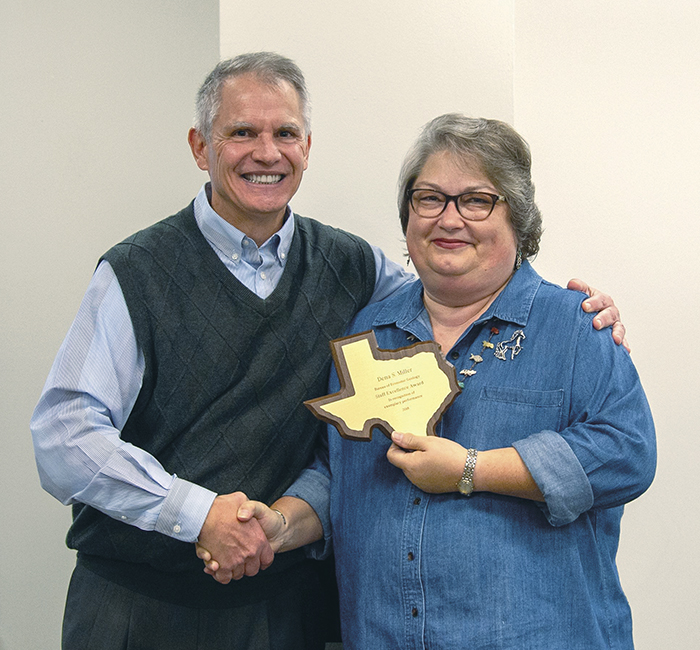
Associate Director Mark kept the Bureau functioning smoothly. Shuster and Dena Miller
The winner of the 2019 Bureau Staff Excellence Award, given to administrative and support staff who have made exceptional contributions to the Bureau, is Senior Administrative Associate Dena Miller. Dena's outstanding support of the associate directors and focused effort on delivery and improvement of Bureau administrative processes kept the Bureau functioning smoothly.
Alumna of the Year
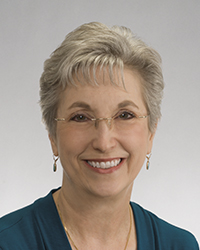
Wanda LaPlante
The winner of the Bureau's 2018 Alumna of the Year award for commitment and impact for one-third of a century went to Wanda LaPlante. In her last role at the Bureau, as executive assistant to Scott Tinker, he dubbed her, "the ambassador of Bureau hospitality and professionalism
Cheney Science Award: Scott Hamlin
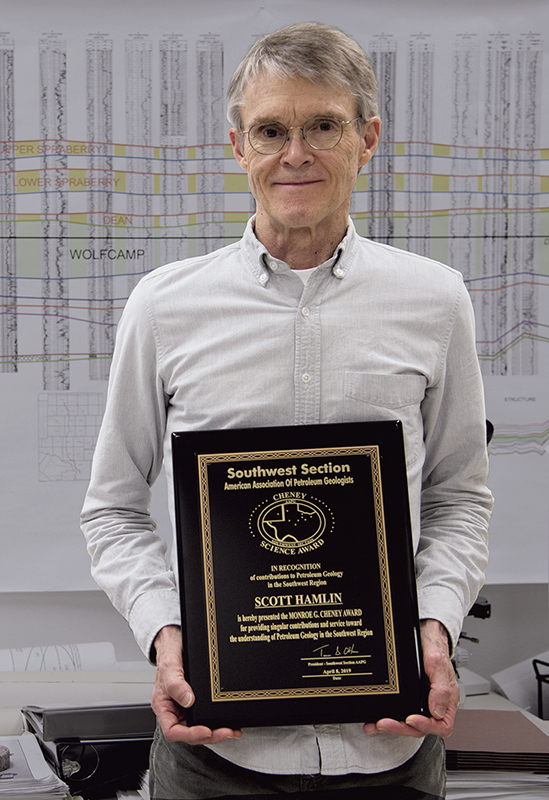
Scott Hamlin
Dr. Scott Hamlin was honored with the 2019 Monroe G. Cheney Science Award by the Southwest Section of the American Association of Petroleum Geologists. The award is given "for singular contributions to and achievements in the science of petroleum geology of the southwest region."
Hamlin is an energy geologist and hydrogeologist whose primary research is focused on stratigraphy, depositional systems, and sedimentology. He uses geophysical logs calibrated with well cores and outcrops to construct regional stratigraphies and to map lithofacies for several unconventional oil plays. He has also mapped groundwater aquifers throughout Texas and Louisiana.
Prior Bureau recipients include Jerry Lucia (2009), Bob Hardage (2006), and Frank Brown (1990). Said Hamlin, "To say that I was surprised to receive this award is a huge understatement!"
O. E. Meinzer Award
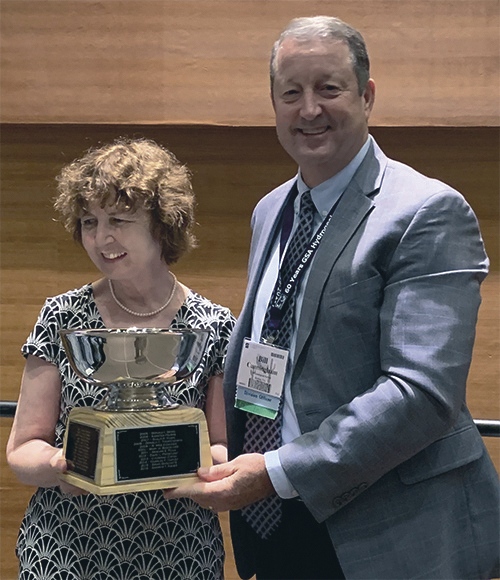
Bridget Scanlon with William Cunningham of the GSA
The Geological Society of America (GSA) Hydrogeology Division has awarded Bureau Senior Research Scientist Bridget Scanlon its 2019 O. E. Meinzer Award, which is presented annually to the author or authors of a published paper or body of papers of distinction that advanced the science of hydrogeology or some closely related field.
Scanlon has conducted hydrogeology research in Europe, North America, Africa, and Asia, on topics ranging from karst hydrology to vadose-zone hydrology to ground-water management, at scales from soil ped to subcontinental. Scanlon's selection for the award was based on four highly cited papers that are representative of the scope of her work:
- Scanlon, B. R., et al., 2002, Choosing appropriate techniques for quantifying groundwater recharge: Hydrogeology Journal, v. 10, no. 1, p. 18–39.
- Scanlon, B. R., et al., 2006, Global synthesis of ground-water recharge in semiarid and arid regions: Hydrological Processes, v. 20, no. 15, p. 3335–3370.
- Scanlon, B. R., et al., 2012, Groundwater depletion and sustainability of irrigation in the U.S. High Plains and Central Valley: Proceedings of the National Academy of Sciences, v. 109, no. 24, p. 9320–9325.
- Nicot, J.-P., and Scanlon, B. R., 2012, Water use for shale-gas production in Texas, U.S.: Environmental Science & Technology, v. 46, no. 6, p. 3580–3586.
The first two papers helped establish Scanlon as "the leading global expert on groundwater recharge," according to nominator Jack Sharp. Nominator Lenny Konikow noted that the second paper "laid the groundwork for later global analyses based on climate modeling and remote sensing data." The Environmental Science & Technology paper was among the first studies to quantify water use for hydraulic fracturing, which is increasingly important in U.S. energy production and is likely to become significant in other countries, particularly China.
Said Scanlon, "I am extremely grateful for my colleagues at the Bureau of Economic Geology, particularly Bob Reedy, who has worked closely with me for over 20 years. Within the past 10 years, our research group has begun evaluating the interdependence of water and energy, including energy extraction and electricity generation. I learned from the early work that J.-P. Nicot initiated on this topic and enjoyed collaborating with him on many projects related to unconventional energy extraction."
Scanlon also expressed gratitude to Jack Jackson for providing his generous endowment to UT Austin's Jackson School of Geosciences, and to the Fisher Endowed Chair in Geological Sciences for its support. Said Scanlon, "I am very grateful for all the opportunities arising during my career and look forward to continuing much of this work in the future. I greatly appreciate having been given this most prestigious award."
Bureau Researchers Honored at AAPG Annual Convention

Receiving honors from AAPG (from left to right): Sergey Fomel, Toti Larson, Julia Gale, Steve Laubach, and Reinaldo Sabbagh.
At its Annual Convention and Exhibition (ACE), held in San Antonio, Texas, in May, the American Association of Petroleum Geologists (AAPG) recognized a number of Bureau researchers for their accomplishments.
Sergey Fomel received the SEG/AAPG Best Paper in Interpretation Journal Award, and Toti Larson was among those recognized with the Jules Braunstein Memorial Award for the best poster-session paper presented at the 2018 ACE.
In the AAPG Petroleum Structure and Geomechanics Division, Julia Gale and Steve Laubach were recognized with Best Recent Publication for 2019 for their paper, "Correlation Analysis of Fracture Arrangement in Space." In the AAPG Division of Environmental Geosciences, Reinaldo Sabbagh received the Best Poster Award at the 2019 ACE.
Publication Awards
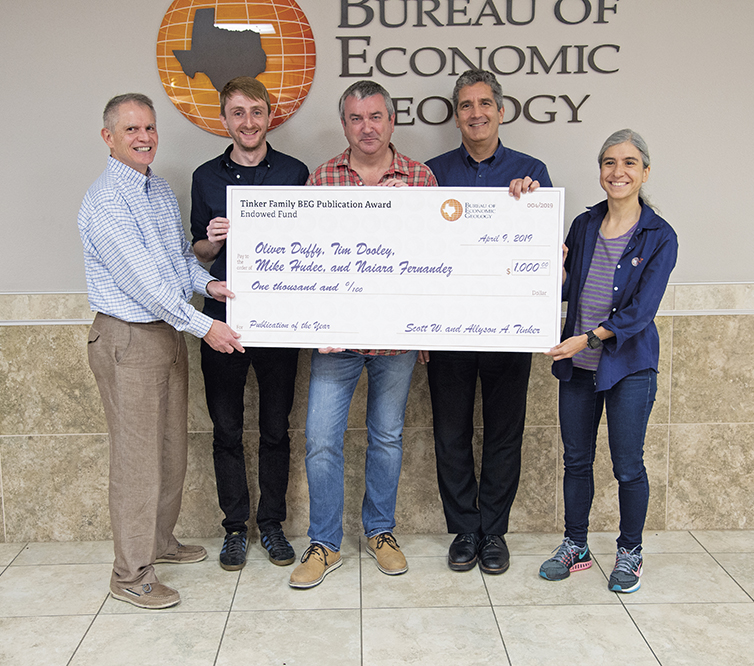
Bureau Acting Director and Associate Director of Energy Mark Shuster (left) presents the 2019 Tinker Family BEG Publication Award to Oliver Duffy, Tim Dooley, Michael Hudec, and Naiara Fernandez.
In April, Bureau leaders and researchers held their annual First Author Publication Awards dinner to celebrate another year of influential publications—the Bureau's most vital product. The event recognized 38 first authors of papers written in 2018, a year in which Bureau researchers published 123 peer-reviewed papers and were first authors on 48 of these, or coauthors on another 18 that were first-authored by their students.
The highlight of the evening was the presentation of the Tinker Family BEG Publication Award, "given in recognition of an exemplary publication of demonstrated or expected scientific or economic impact, or that otherwise increases the visibility of the Bureau scientific community." This year's recipients were researchers Oliver Duffy, Tim Dooley, Mike Hudec, and Naiara Fernandez— along with coauthors Martin Jackson, Christopher Jackson, and Juan Soto—for "Structural Evolution of Salt-Influenced Fold-and-Thrust Belts: a Synthesis and New Insights from Basins Containing Isolated Salt Diapirs." Runners-up were researchers András Fall, Lucy Ko, Steve Ruppel, Bob Loucks, and Tongwei Zhang; and Alexander Sun and Todd Caldwell.
Fomel and Wu Recognized by SEG
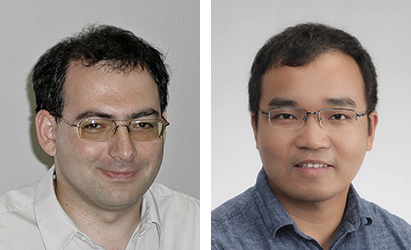
Sergey Fomel (left) and Xinming Wu (right)
Bureau researchers Sergey Fomel and Xinming Wu were recognized by the Society of Exploration Geophysicists (SEG) at the group's annual meeting in San Antonio, in September, receiving 2018 Best Paper in Geophysics Honorable Mention for "Least-Squares Horizons with Local Slopes and Multigrid Correlations."
Both Fomel and Wu were also selected as SEG lecturers for the coming year. Fomel was named SEG 2020 Distinguished Lecturer and will speak on the topic "Automating Seismic Data Analysis and Interpretation." Wu was selected to be the SEG 2020 Honorary Lecturer for South and East Asia and will speak on "Deep Learning for Seismic Interpretation."
Both scientists have been recognized numerous times by SEG in previous years. Fomel received the J. Clarence Karcher Award in 2001, Top Poster Presentation Awards in 2007 and 2011, and the Conrad Schlumberger Award from the European Association of Geoscientists and Engineers in 2011. Wu received the Best Paper in Geophysics Award in 2016 and Top Student Poster Paper in 2017.